by David Sheen
As activists across the United States struggle to keep the topic of systemic discrimination against Black people on the national agenda, African communities in Israel are also increasingly speaking out against state racism.
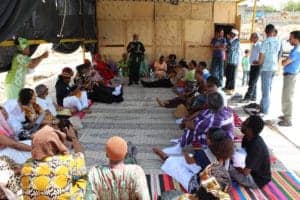
For the last month, Ethiopian-Israelis – Jewish citizens of African descent – have rallied across the country, demanding an end to racial profiling and police brutality. The catalyst for the protests was a widely-shared video clip of an Ethiopian-Israeli being beaten by police officers, without just cause. But protesters also cited racial discrimination in jobs, housing and education among their concerns.
On April 30, thousands of community youth converged on the prime minister’s residence in Jerusalem to vent their pent-up frustrations, and three days later they descended on downtown Tel Aviv, blocking 10 lanes of traffic for hours on end. In both cases, Israeli police responded with weapons that it rarely uses on Jews: tear gas, water cannons, stun grenades.
For the last month, Ethiopian-Israelis – Jewish citizens of African descent – have rallied across the country, demanding an end to racial profiling and police brutality.
Although police have responded to the Ethiopian protests with force, Israeli lawmakers across the political spectrum have tried to placate the community with promises of changes to come. Just days after the rallies, Prime Minister Netanyahu held a public meeting with the young Ethiopian-Israeli man whose beating sparked the protests, vowing that a newly-appointed task force would work to meet the demands of the community.
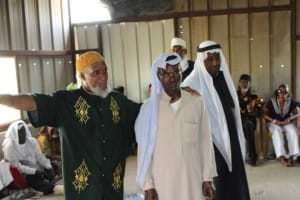
Past protests by Ethiopian-Israelis have garnered similar statements of solidarity from top ranking Israeli officials but have borne little fruit. As they constitute only about 2 percent of the population of the country, Ethiopian emigrés have little leverage in Israel, and thus far they have not managed to consolidate significant political gains. Half of all Ethiopian-Israelis and two-thirds of Ethiopian-Israeli youth remain mired in poverty, according to the Center for the Renewal of Israeli Democracy.
Still, this public embrace by Israeli leaders is indicative of their conciliatory attitude towards Africans who are also Jews and stands in sharp contrast to the conduct afforded to the other African communities in Israel that are not Jewish. The treatment that African Bedouins, African Hebrews and African refugees have received from the Israeli state has been far less obliging.
Like their Arab Bedouin brethren, African Bedouins receive just a fraction of the rights and privileges they are entitled to as citizens. While some Bedouin settlements are eligible for state support, many of their villages are not recognized by the government.
In an effort to contain non-Jews to smaller spaces and open up large swaths of land to Jewish-only settlement, the Israeli government has refused to connect tens of thousands of Bedouins to water lines and electricity cables and continually threatens to bulldoze their homes and build Jewish towns on top of them.
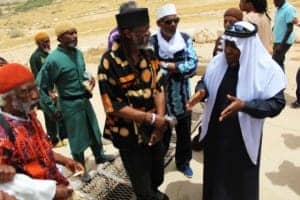
For another group of Africans in Israel, embracing an Afrocentric form of Old Testament Yahwism has heralded both spiritual sympathies and religious rivalries.
When the African Hebrew Israelites, a community of African Americans, first immigrated to Israel in the 1970s and ‘80s, they were rejected by the chief rabbinate because their spiritual practices diverged from normative Judaism. For decades the Israeli government tried to deport them and only altered its antagonistic approach in 2003.
In that year, the state agreed to grant the group citizenship if its children would serve in the Israeli army.
Today, the community’s allegiance to the Israeli state plays an important role in Israel’s efforts to combat accusations of systemic racism. However, over a decade after signing a blood pact with the Israeli government, most community members still do not have permanent status, and some do not have any legal status at all, leaving them without access to health care, education and the formal job market.
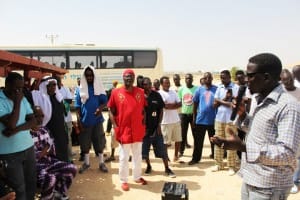
But the Africans who have suffered from more discrimination than any others in Israel have been the refugees who immigrated to the country between 2007 and 2012. During those six years, about 65,000 sub-Saharan African Christians and Muslims, primarily from the East African nations of Eritrea and Sudan, crossed into Israel by foot, fleeing repressive regimes and ethnic cleansing. The Israeli government has only granted refugee status to four of these Eritreans and none of the Sudanese.
After building an expensive security fence on its African border to choke the flow of migrants, the Israeli government passed laws intended to make the lives of the asylum-seekers next to impossible, hoping that this would encourage them to leave of their own volition. By forbidding them from working and forcing thousands of them into desert detention centers, the government has pressured about a third of them into grudgingly agreeing to return to Africa. But as returnees report that they have fared no better back on the continent, fewer asylum-seekers are opting for Israel’s offer of repatriation.
The Africans who have suffered from more discrimination than any others in Israel have been the refugees, primarily from the East African nations of Eritrea and Sudan, who immigrated to the country between 2007 and 2012.
As dozens of African-Americans visited Israel this week to celebrate the annual African Hebrew festival of New World Passover, the Hebrews organized a pan-African summit to unite communities of color in the Holy Land. The day-long trip across the Negev desert, which included meetings with the African-Bedouin communities of Rahat, Wadi Na’am and Segev Shalom, demonstrated that despite the prevailing popular image of Israel as an amalgam of European Jews and Asiatic Arabs, there are also significant communities of indigenous African people living on the land.
While the bonds between these two African communities, Hebrews and Bedouins, have been consciously cultivated for decades, their outreach to the African refugee community in Israel is a new phenomenon. As non-white non-Jews who migrated to Israel most recently, the asylum-seekers are probably the least popular people in the country, and the government’s efforts to expel them are widely supported.
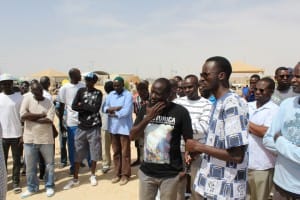
Openly expressing solidarity with the detested refugees is an act that carries a high political price, especially for communities that are already marginalized by the state. So on Sunday, when the Hebrews finally elected to breach this barrier and visit the asylum-seekers Israel is holding at its desert detention center Holot, the visit was imbued with historic proportions.
Stepping out of their air-conditioned tour bus into the searing hot desert sun, the African Hebrews and Bedouins exchanged warm greetings with the refugees and gathered together to hear their stories of suffering. After learning first-hand of their hardships, the visiting Africans tried to inject some cheer into the lives of the asylum-seekers with proclamations of pan-African solidarity, prayer, song and dance. Although the visit only lasted a little over an hour, it represented a critical communion for African peoples in the Holy Land.
Each of the African communities in Israel faces a slightly different set of challenges under a regime that doles out privileges based on both skin pigment and religious origin. These extenuating circumstances have long delayed any state-wide African alliance, especially with the refugee community.
But now that at least some of these communities are actively collaborating, there is optimism amongst activists that ties between them will translate into deep exchanges and aggregated struggles for racial justice.
David Sheen is an independent journalist and filmmaker originally from Toronto, Canada, who now lives in Dimona, Israel. Sheen began blogging when he first moved to Israel in 1999 and later went on to work as a reporter and editor at the Israeli daily newspaper Haaretz. His full-length documentary on ecological architecture, “First Earth,” was translated into a dozen languages and published by PM Press in 2010. Sheen gave a TEDx talk on the topic of the film in Johannesburg, South Africa, later that year. He is currently writing a book about African immigrants to Israel and the struggles they face. Sheen’s website is www.davidsheen.com and he tweets from @davidsheen.





